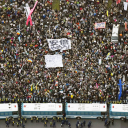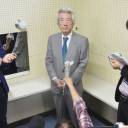On April 3, the ruling coalition adopted a plan for integrated resorts featuring casino gambling that it will submit for Diet approval during the current session, although some media organizations think that won’t happen. The public still isn’t comfortable with the idea of casinos and the coalition’s compromises may make the bill less effective in terms of stimulating the economy, which is the whole point of legalizing casinos.
The media itself is divided into predictable camps, with dailies who generally support the ruling coalition also supporting the plan, centrists such as the Asahi Shimbun opposed to it and television stations remaining neutral except when it comes to variety shows, which enjoy sending celebrity reporters to existing casinos to see what all the excitement is about.
In an April 6 editorial, the liberal Tokyo Shimbun was practically puritanical in its condemnation of the plan, stating that “growing the economy” through promotion of gambling could lead to the “collapse” of Japan’s “beautiful customs” (bifū). It argued that gamblers are people who make money without application of effort or skill, and think that using casinos to lure foreign tourists corrupts the meaning of travel. They also think the plan’s limits for Japanese and foreign residents — a ¥6,000 admission fee and weekly and monthly restrictions on casino visits — will do nothing to curb gambling excesses.
This last point was discussed thoroughly on the Agora blog site by Noriko Tanaka, who heads a foundation that addresses gambling addiction. The admission fee is pointless, she says, because it will discourage Japanese who enjoy gambling as an occasional pastime and do nothing to affect the betting behavior of compulsive gamblers, to whom ¥6,000 is “nothing.” Moreover, the draft’s restrictions on casino visits — no more than three a week or 10 a month — are meaningless since casinos are open 24 hours a day and addicts tend to stay until they run out of money, or worse.
The regulations are based on the Singapore model, which Tanaka says has already proven to be unsuccessful at curbing compulsive behavior in the city-state. Although the Japanese politicians who devised these rules give a lot of lip service to addiction, they did not talk to people such as Tanaka who work on the front lines of the problem. They only talked to casino operators in Singapore.
But even in terms of financial impact, the Tokyo Shimbun finds the plan unconvincing, questioning the coalition’s pledge to limit the number of casino locations to three. Such a small number means nothing economically, so the number will probably be increased somewhere along the line. They also see little in the plan that’s in the public’s interest. Some profits from horse racing and other legal public gambling now go to central and local governments, but taxes on casino profits will be only 30 percent.
The opinion that economic effectiveness is not assured by the plan is shared by reporter Yasuhiro Idei. In an article in the March 19 online edition of business magazine President, Idei reviewed the history of the pro-casino movement, pointing out that while former Tokyo Gov. Shintaro Ishihara couldn’t get approval for casinos on the waterfront in the early 2000s, Prime Minister Shinzo Abe has managed to get the central government to legalize them, the reason being that the casinos that opened in Macau and Singapore in the past decade or so are making tons of money, mostly from Chinese visitors, so why shouldn’t Japan exploit this Asian potential as well?
Idei dismisses the kind of moralistic rationale put forth by the Tokyo Shimbun, saying that the public’s opposition to casinos — a Kyodo survey recently found that 65 percent of respondents don’t want them — is merely reflexive, and scare tactics using the specter of gambling addiction are “trite.” Gambling has always been popular in Japan and the country has not gone bankrupt as a result.
However, he also disagrees with the direction of the pending legislation. He understands the government’s envy of Singapore and Macau. By 2013, Macau’s casino revenues were six times those of Las Vegas. Around the same time, the two casinos that had been opened in Singapore were making as much money as all the casinos in Vegas. However, revenues have been dropping ever since the Chinese government launched its anticorruption campaign — many rich Chinese laundered their money in Macau — and started limiting how much cash its citizens could take out of the country. Japan wants to be the new destination for Chinese high rollers, but there may not be enough to go around. Casino employees in Singapore and Macau at least speak Mandarin.
Besides, the foreign casino operators who have pledged ¥1 trillion in investment when Japan approves casinos want local customers, because they think Japanese have lots of money and the opportunity for profit is huge owing to the belief that the pachinko industry rakes in more than ¥25 trillion a year. It means nothing to them that the government doesn’t recognize pachinko as a gambling activity. Consequently, time limitations and admission fees could be more discouraging to these operators than to potential gambling addicts. Another disincentive may be the rule that only 3 percent of an integrated resort’s floor area can be used for the casino. Integrated resort operators don’t make nearly as much money on hotels, shopping, conventions and entertainment as they do on gambling, so limited casino space could mean less return on their investment than expected.
The plan was formulated to placate casino skeptics, but nobody on either side of the argument seems satisfied with it, which says more about politicians’ priorities than anything else. As international affairs expert Nobuhiko Suto explained during an April 7 discussion of the issue on web channel DemocraTV, integrated resort promotion, like most economic stimulus plans in Japan, is really about pleasing lawmakers’ construction industry buddies. What comes later is anybody’s guess.
| < Prev | Next > |
|---|









 Copyright © 2024 ToCasino.net Online Casino. All Rights Reserved. Designed by
Copyright © 2024 ToCasino.net Online Casino. All Rights Reserved. Designed by